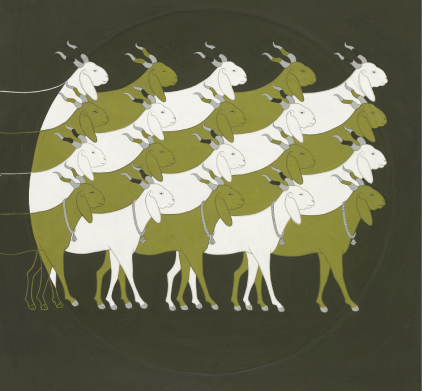
Note 10
In this, the March 2013 release of Out of Print, our tenth, we feature five stories. They range in focus from accenting societal disparities, as in Sathya Saran’s The Anklet, and Murli Melwani’s Gift for the Goddess, to looking inward as in Salma’s On the Edge and Rheea Mukherjee’s A Larger Design, where quotidian navigations are skewed by the characters’ psychologies, and Tanuj Solanki’s Sentatoms, in which the personal and the creative are examined.
Salma’s On the Edge, translated from Tamil by N Kalyan Raman follows a young woman and her relationships with members of her family. Two older women who are part of the household have serious health issues, physical, and psychological, and the complexities of compassion, anger, desperation and love that layer the main character’s emotions and actions as she negotiates the car journey to the hospital while managing their interactions with each other, are extraordinarily detailed. Like the ‘he’ in Hilary Mantel’s Bringing up the Bodies that refers either to Cromwell, or to other men, the ‘she’ in On the Edge is either the main character or the other women, and although, unlike Mantel, Salma does not always specify who is being referred to, there is no ambiguity in understanding the flow of the story.
Written with a clear voice, true to its characters, in A Larger Design by Rheea Mukherjee, a mother must deal with her daughter, ‘an offspring of a larger design’. The story begins in a bus, when Mary Joy, absorbed in the minute specks of blue that inhabit the pattern of her sari, looks up to find her daughter attempting the extreme. ‘Why Menu…?’ she asks, although she, of all people, perhaps understands. Tanuj Solanki’s Sentatoms also begins in a bus and maps a journey, this time in the high mountains. A memoir, a travelogue, an exploration of creativity, a love story, a story of self, Sentatoms is structured into chapters that follow the narrator, a writer. I quote from Chapter 16, ‘For writers, writing is dreaming. For dreamers, dreaming is writing.’
Sathya Saran’s The Anklet, delicately written, finely felt, is about ‘… a single ornament. Caressed by dust, marked by wear.’ As the subtitle, A Short Story That Could Be True indicates, the narrative follows the passage of the anklet through an extremely plausible set of events, from embellishing the fragile limb of one woman to being in the possession of another, from being a gift of love to being an object whose beauty captivates. Gift for the Goddess by Murli Melwani, is set in landscape that is arid and grim. Telling the story of a dam site, his perspectives on, in his own words, ‘a country caught between tradition and modernity, science and superstition’ are subtly inscribed. The straightforward telling, the clean structure, and the apparent simplicity of the story hide a terrifying tale of corruption in its most extreme – and of futility.
The issue brings new features: the links have now been organised so contributors, and successes that pertain to the authors are more easily accessed. A list of works that we run on occasion on the blog, stories that are chosen on a case by case basis, may also be read through the links.
As always, it is an honour to present the new edition of Out of Print. Thank you.
The art on the cover of Out of Print 10 is by Olivia Fraser.
